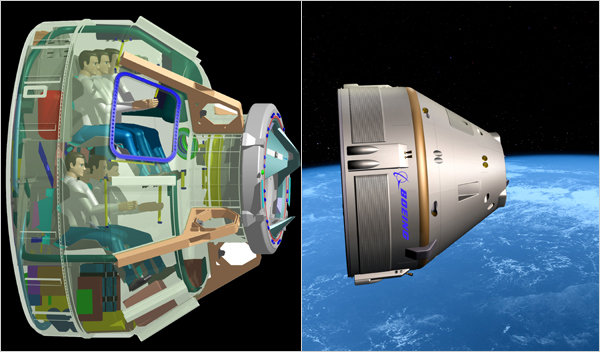 Holman Jenkin’s column in WSJ taking Obama to task on his space policy. It’s not that Jenkins disagrees with the internationalization thrust. He just says Obama has done a terrible job of getting Congress on board.
Holman Jenkin’s column in WSJ taking Obama to task on his space policy. It’s not that Jenkins disagrees with the internationalization thrust. He just says Obama has done a terrible job of getting Congress on board.
The way he makes it sound, the White House is in full retreat, accepting a compromise bill by FLA senator Bill Nelson, “the ‘compromise’ being that the programs the president wanted to cancel will be renamed and spending accelerated.”
Missing in Nelson’s bill is all the money Obama wanted to redirect to private entrepreneurs to take over the task of keeping low Earth orbit projects supplied with astronauts and material.
The usual answer from pork barrel-rollers in Congress persists: only NASA is qualified to operate in space, an opinion that dooms us to suboptimal outcomes that eventually, entrepreneurs from elsewhere—apparently, will surpass.
Jenkins notes that while the private sector is clearly incentivized to strive for the safest possible operation that is economically feasible, NASA is just as clearly incentivized to “spend as much as possible to do as little as possible.”
Jenkins says the private space industry in the US has survived on mega-rich angel investors, pinning their hope that Obama would pull a space-age equivalent of the Air Mail Act of 1925, which had the effect of lofting the early airline industry.
Instead, Nelson bests Obama strictly out of greed for jobs in his state.
Sad state of affairs.
We can only hope that Richard Branson and Burt Rutan’s Virgin Galactic dramatically outshines NASA in the eyes of taxpayers, who thereupon should demand better use of their tax dollars.
Excellent piece by Jenkins.
 Monday, June 25, 2012 at 11:42AM
Monday, June 25, 2012 at 11:42AM Misha Glenny making a smart case in the New York Times for a cyber arms control treaty, but it won’t happen.

 China,
China,  Defense,
Defense,  India,
India,  Obama Administration,
Obama Administration,  US Military,
US Military,  cyberwarfare,
cyberwarfare,  security,
security,  space | in
space | in  Time's Battleland |
Time's Battleland |  Email Article |
Email Article |  Permalink |
Permalink |  Print Article
Print Article 











